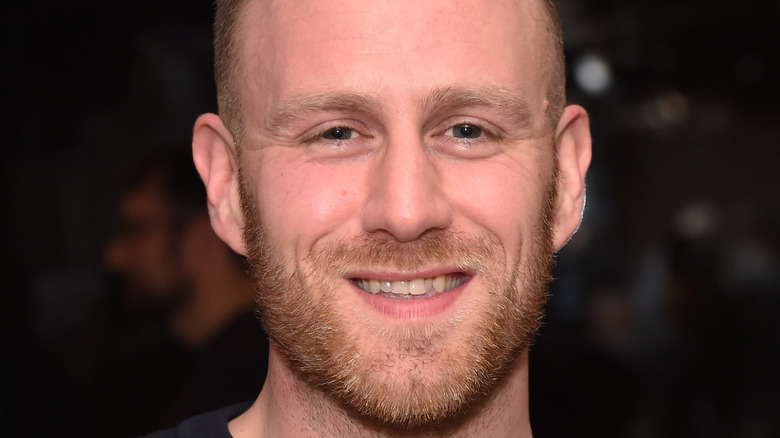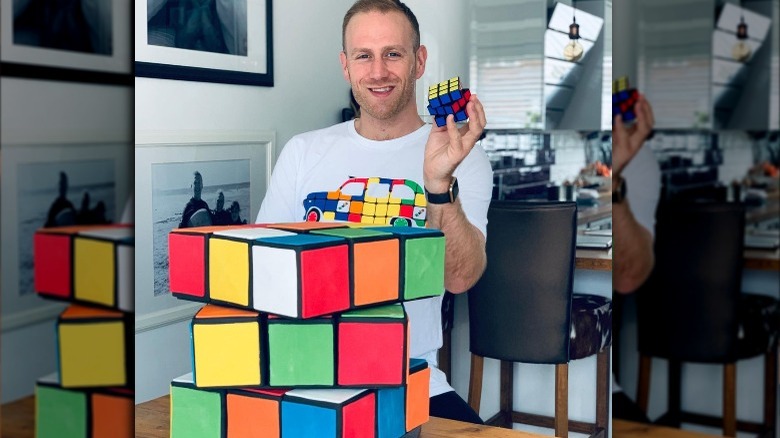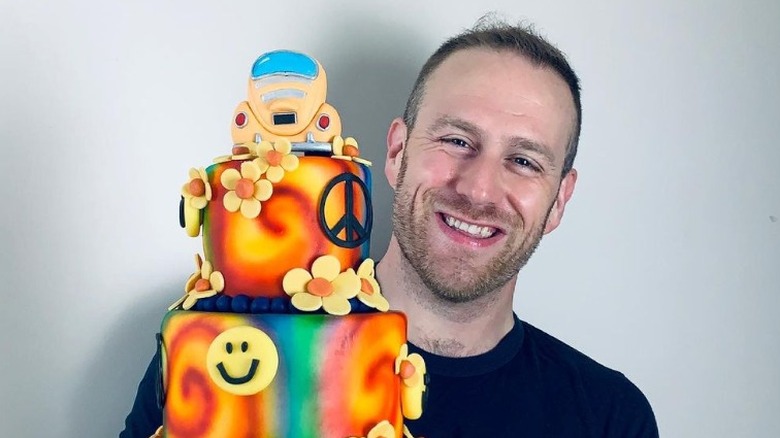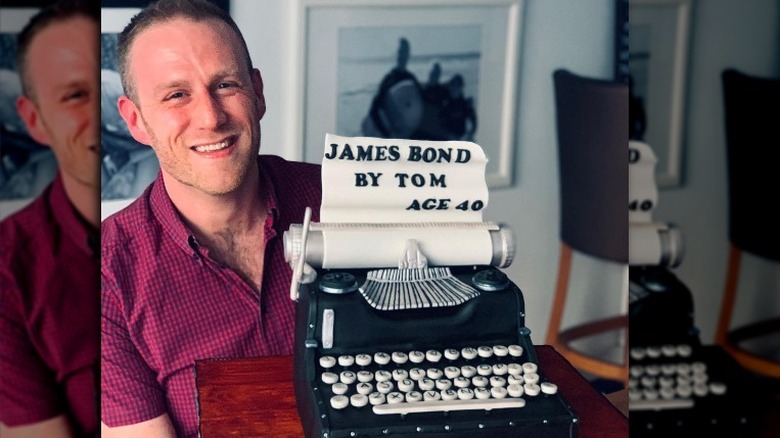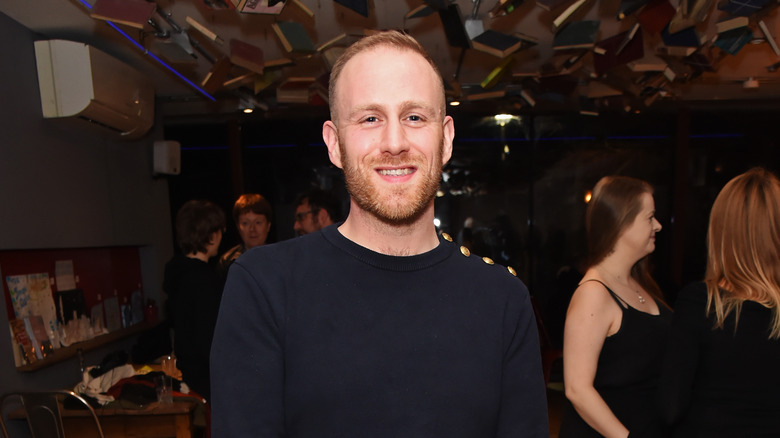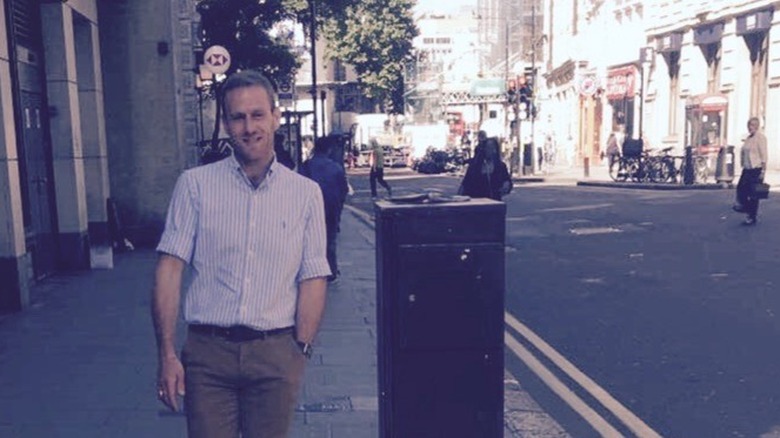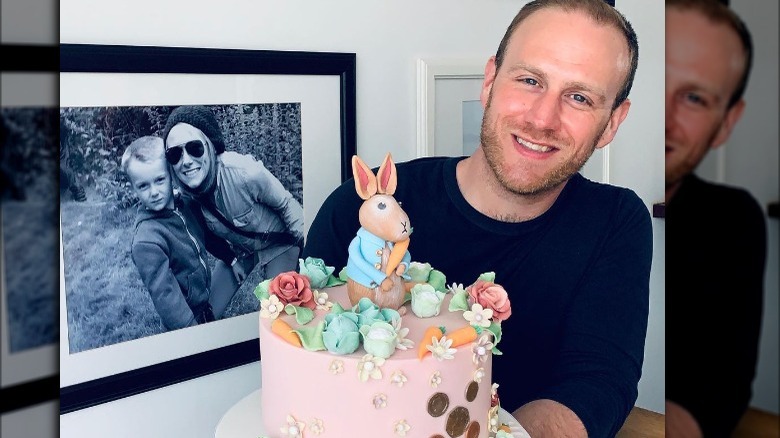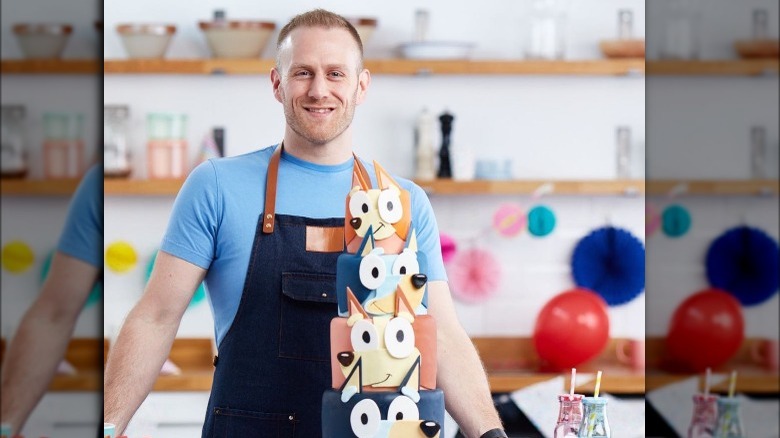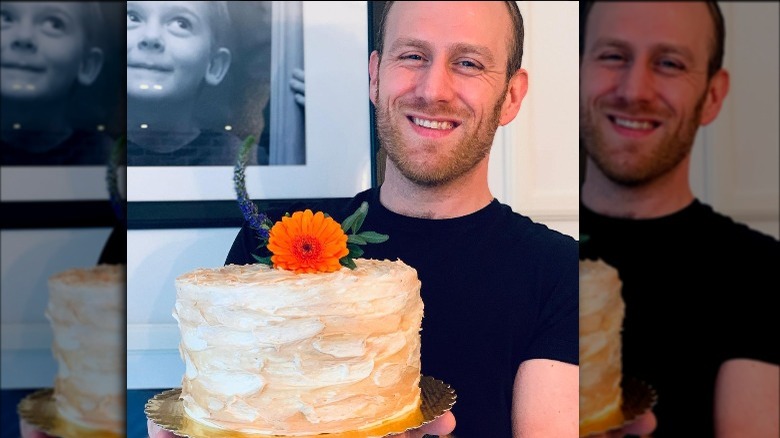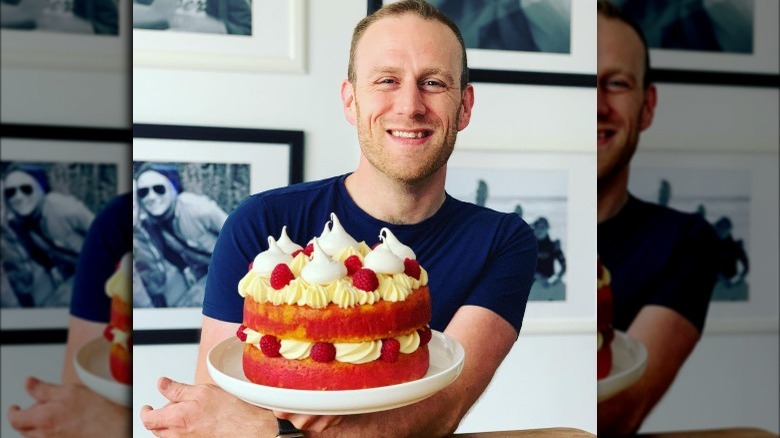Steven Carter-Bailey Tells All About The Great British Bake Off - Exclusive Interview
Take a tour through Steven Carter-Bailey's Instagram showcase. "The Great British Bake Off" 2017 finalist and 2019 "Holiday Special" winner's cakes don't sneer out at you. Quite the opposite. Cater-Bailey's cakes — much like Carter-Bailey himself — are full of joie de vivre. They're magnificent and colorful. Even without tasting them, they make you want to do cartwheels.
Full discloser: we're still waiting to try one of Carter-Bailey's Hollywood handshake-winning creations. But if you need more than Paul Hollywood to convince you — Ian McKellen looks happy with his chocolate birthday cake on Carter-Bailey's Instagram feed. And "Queer Eye's" Jonathan Van Ness is smelling sunshine in the Insta snapshot next to his cinnamon roll cake. Carter-Bailey, turns out, is friends with Tan France — who you might remember from "Celebrity Bake Off 2020." No, the GBBO alum didn't give France any advice. "I wouldn't have needed to, because Tan is one of those that when he puts his heart and soul in something, he does it as best he can," Carter-Bailey told Mashed. It's too late for France to benefit from this inside-info. But for anyone else who's thirsty for it, Steven Carter-Bailey opened up on the ups and downs of his "Great British Bake Off" journey and passed along some unmissable tips and tricks of the baking trade in this exclusive interview with Mashed.
Steven Carter-Bailey spills on the backstories behind his Instagram photos
How long have you spent, max on a cake?
Oh my goodness. I think the longest I ever took was probably the first wedding cake I did. But I was so inexperienced that everything took three times as long ... I made it slowly over the course of four weeks, but I was working during the day and then the evenings. That was 150 individual sugar roses that were decorating a cake. I think from an all-in-one, end-to-end process, [it] was the Rubik's Cube cake. Which was, I think, four days.
You made a cake for Ian McKellen for his birthday. Tell me the story behind that.
It was through a friend ... Obviously, I knew that it was his birthday coming up and I said, "I'd love to make him a cake." Just the chain of events kind of happened in the background, and my friend comes in and said, "He'd love it. He would love to have a cake for his birthday." [Ian McKellen] was celebrating his 80th birthday with a tour across the country that goes into different theaters and giving a performance. I was going to the one at the [Harold] Pinter Theater in London, and I said I would present it to him there. I knew that he loved chocolate cake so I made him a blue and gold chocolate cake. I was so overwhelmed. I think he's probably the only person I've ever had, like celebrity fear.
I was so just confused, baffled, amazed, shocked, and stunned into silence. Because, I mean, this is Gandalf! As well as this incredible Shakespearian actor who has, I think he had 65 years on the stage at that point. He's just the most incredible character. But he was so polite, he was so kind. If it wasn't for him, I wouldn't have that picture [on Instagram]. He asked me for a picture. Because I was just so gobsmacked. I stood there like an idiot, really, just for like 10 minutes while he spoke to me.
What's the story behind your picture with Jonathan Van Ness from "Queer Eye"?
I'm good friends with Tan France ... Tan was touring the U.K. with his book and he'd said, "Oh, you know Jonathan's coming over to do the same, why don't you surprise him with a cake?" The look of, like pure joy on Jonathan's face is genuine. Because he didn't know I was coming. I'm sure Tan must've told me that he loved — cinnamon buns, is it?
So I designed a cinnamon bun cake for him. And I had been working with his P.A. secretly in the background. At the end of the show, I walked into his dressing room and was just there with the cake. He's so sweet and kind and loving, and he's everything that you see and more. He's very affectionate. He was so touched that somebody had done that. He's one of those people that has never lost touch with reality through the fame process. He's still a young boy who had a cake.
How Steven Cater-Bailey finally got on The Great British Bake Off
You auditioned a couple of times before you finally were able to participate in the 2017 season [of "The Great British Bake Off"]. What was it that drove you to audition so many times?
Seven seasons over here were aired by the BBC, BBC One. BBC, BBC One — which is obviously the two national channels here. I had applied in the second year, having watched the first season. And I thought, "Oh, okay..." At the time I was maybe more novice than I was when I applied [the last] time. But I thought, "Well, you know it could be fun." So I applied and I got a phone call and they were like, "Oh, okay, well, we'd love to see, we'd love to give you a callback." They called me back. And this process is really long. It's a really long process. Then I didn't hear anything. So I thought, "Okay, well, never mind." I applied the year after. And I think I only got the first phone call, and then nothing.
I was kind of disheartened by it. Then, by what was then the fourth year on BBC, it was so big that I kind of thought, "Well I'll never get through." Then at the end of 2016, they announced that ... Channel Four had bought out the rights to the show, and that going forward, it would be aired on Channel Four here. There was a huge national drama around it. Because, obviously, Mary Berry and Mel Giedroyc and Sue Perkins were leaving and they were bringing in two, three new people. I kind of thought, "Well, now's a good as time as any to try my luck." Because it was going through a different channel.
What it's really like to be a Great British Bake Off competitor
What made the difference [the last time you applied]? What made the season that you were on be the season that you were on?
I had actually been kind of coerced into doing it by a colleague at work. She told everybody that I was going to do it, so I kind of had no choice. I applied and to be honest ... I think that had a drink when I applied. I don't know if it was a mistake because it was a digital application. I don't know what my application said ... But I was probably very descriptive in my application. To be honest, I didn't think much of it when they called. I didn't think much of it when they called the second time, because we'd been through this before. Then they called me back for an interview and I thought, "Oh, here we go. This could be different." And then three months later, I'm standing in front of the camera.
Having gone through the prep process twice for a show like this, can you give some insight into what it's like prepping for "The Great British Bake Off"?
The prep is the hardest thing I've ever done ... So from application through to completion, "The Great British Bake Off" has been compared to a dissertation for a post-degree. Achieving a diploma or a college degree, it's hard work. It's just constantly there at the forefront of your mind. The application process is not tough, in that it's hard to do. It's just constant questions, interviews, questions, interviews, credit checks, police checks, health checks, psychiatric checks, ability checks. You're constantly going down in front of cameras, [getting] checked for stress levels. Could you cope in a strenuous environment? How would you deal with press hatred? How would you deal with being with the parishioners of the street? There's this huge, like prep for it when you get there — and then you get on the show.
You get your phone call [saying], "Congratulations you're one of the 12 bakers this year." Then the real work starts.
This is how filming Great British Bake Off really felt for Steven Cater-Bailey
Can you give us insights into prep for "The Great British Bake Off" challenges?
You can prep for your signature bake ... And the showstopper, you can prep for. The technical you never know until the day [of]. You get given a ... a brief, so to say, for your signature bake [every] week. "We want you to create a fruit cake that has fresh fruit. It must be at least this size, at least this tall, and it must have this." So really, by the end of the episodes, the requests get really bizarre. But at the beginning, it's just like, "You need to achieve this." Then, "We want you to create and design this recipe, perfect it, then write the recipe for it. Then write the instructions and give us a story behind what you made," and all this.
Which is fine when it's one. On one Monday you get four recipes, two lots of signatures, two lots of showstoppers. The week later you get another four, and then a week later you have to submit week one, and then you get another four. It's just ... constant sheets of paper, everywhere. So much paper just littered across my sitting room. I was working in London. At the time, I lived outside, in the suburbs and I was getting up at 6:00 AM. I was commuting into the city, I would work until 4:00. I would leave the office, I'd get home, I would bake until 2:00 in the morning. I go to bed and just do that cycle four days a week constantly.
When it came to filming ... on Friday, I would drive down to the hotel, stay overnight. Obviously not sleep because I was stressed. You got up at 4:00, 4:30, you get driven to the sites — the tent. You filmed for the Saturday and Sunday. Then — if you get through — then, you go home and then Sunday night I would go back. I would literally get back from the tent, at 8:00 at night, 9:00 at night. I would bake [until] 2:00 in the morning, get up at 6:00. I just did that for three months.
I found a picture the other day ... It's a picture of me taken in middle of June 2017. I was probably halfway through filming? And I look like I was so skinny and I'm tired, I hadn't been sleeping properly ... It was hard but I would do it again tomorrow happily.
Steven Carter-Bailey on the pressure during The Great British Bake Off
That kind of stress level and anxiety you've talked about — is that something that is just inevitable for a part of these food competitions?
I think it's a very hard topic to sort of comment on because I agree that there needs to be more done. I don't know what more could have been done for the contestants in the run-up to it. I just think the thrill and the idea of being on the show was so great I would never have questioned it. Even now, I look back and think I would do it again ... I would just be kinder to myself. I think [it's] like any stressful situation, [like ] if you were going for a job, or if you were trying for a baby or something. Because it's such a wonderful potential outcome. Everybody roots you and says, "Come on, you can do this, you can do this. You've got this." So in your mind, anything other than perfection then becomes a failure.
I didn't see that not winning was an option. I felt like I put so much pressure on myself that it got to the point where I broke down. And the final episode, I had probably the worst anxiety attack I've ever had and had to be talked down off a ledge. Sandi Toksvig, in fact, found me outside the tent halfway through the bake and had to kind of coerce me to come back in. Because I just broke down. Because, in my mind, I knew I wasn't going to win. And so I couldn't see another option.
I think one of the producers had said that, "He's gone. He's just walked out." ... I asked them to remove this bit. But you know, I really was at my lowest point. And I think it's a joint responsibility. It's very easy to get swept up in the romance of something like this. Because I didn't know what I was getting myself into, originally. I think halfway through the show, I thought, "Oh my God, this is huge. This is going to be the biggest show on television this year." And the nerves got bigger and bigger. Because I wasn't frightened — I wasn't nervous — in the first few episodes because we were pre-filming. It didn't register, because I didn't have an audience. I thought, "Well, it doesn't matter."
I think it's a joint responsibility. "The Bake Off," or "The Great British Baking Show" is one of the kindest shows. And we are all there for one another, and I had a fantastic support network. The problems for me started when I stopped using that support network. I didn't have a very supportive partner at the time. I stopped talking to my sister, who's my mental support. And I shut off and became almost recluse in the last few episodes. I wasn't sleeping ... There was too much pressure to film in such a short amount of time. And I did say that to them. I said, "Look, the reason I'm under so much pressure is because we finished one episode and I've got three or four days to turn around two new recipes." Which, by the way, would decide whether I win or lose.
But I think there are other shows, especially over here, that are guilty of pushing a forced reality, making people feel that perfection is the only option. They're setting ... unachievable beauty standards for the public. I don't agree with that. But this is baking.
How Steven Carter-Bailey felt when he came in runner-up on The Great British Bake Off
You came in runner-up, ultimately, that season. How did that moment feel given all the pressure? Was that a let-down, or was it positive for you?
I think by the episode end I was so tired, I physically could barely move anymore. I was just happy for it to end, and I wanted to see my mom. I wanted to stop. Not because I wasn't enjoying it, just because I wanted it to finish. I was tired, it had run its course. I knew I wasn't going to win ... I knew that morning I think I wasn't going to win. For me, it was not a let-down and it wasn't disappointing. In fact, since then it has become nothing. Really — because in a way I'm one of the most popular contestants from that episode. That's not me blowing my own trumpet. That's facts, you know? I have to say that just because I didn't get that plate doesn't mean I didn't achieve something.
Sandi Toksvig at the very end, off-camera, said, "For some people, it's better that they don't win because you're going to go and have a fantastic career and you'll be a slow burning flame that will burn brightly." She said, "I want you to continue down that path of slow achievement." She said, "You don't need a big bang and launch into the industry." ... I was so tired, I didn't think about it. But she was right. Because people were upset for me, but they understood. I wasn't upset. It didn't bother me.
I went back and I got another plate. I won the "Holiday Special," so there's my actual plate there. I think it's important for me to continually repeat this message to myself, and to other people. And that is, "first place doesn't necessarily mean you won and second place or third place doesn't mean you lost." Especially now with the Olympics going on. [Winning or losing] doesn't question the amount of hard work that you put in, [or the] dedication. It really doesn't. The outcome for each of us in that season — [and in] other seasons — just proves that it's the effort that pays off. Not the prize.
Steven Carter-Bailey on the British dessert he thinks you should try
What's one British dessert that people in the United States need to know more about?
Well, I'm going to give two, actually. The first one is Eton Mess. I'm sure it's well known over there, but Eton Mess is essentially meringue, crumbled meringue, whipped cream, whipped soft Chantilly cream, and fruits or fruit coulis, like strawberry. It comes from Eton school, but it's the most British dessert you could possibly find. There are others from around the British Isles, Scotland, Wales, Ireland, Northern Ireland, but as far as British desserts go, I think that is the one.
Second, I would love for Americans to appreciate what we do — what we do is suet in the U.K. Suet, I'm sure you know what suet is, but it's an alternative fat. Essentially it's used more in steamed puddings — very, very, very heavy, dense, rich pies and steamed puddings, and those jam roly-polies, which sounds nice. But when I describe it, it's like beef fat pastry roll with jam and steamed. I kind of see why people probably might not want to try it. But I would, I implore anybody to try it at least once. Maybe a lemon steamed pudding ... Actually, obviously if you're living in Arizona, Texas in the summer, or California, you might not want a really heavy pudding. But maybe in the Midwest from November onwards, you might. They might appreciate it more when it's cold and you want something really heavy and comforting.
Sounds like maybe a Thanksgiving dessert.
Yes, exactly. It's a holiday dessert. In fact, I use it in my Christmas puddings.
And [is there] a U.S. dessert that you are particularly fond of?
Oh my goodness. I love cream pies. I did a Martha Stewart coconut cream pie and Ina Garten I think, did a peach. Peach and something cream pie? And then a chocolate cream pie. The whole cream pie family is always a winner. Always, always a winner. But I have to be careful because I'm gluten-free so I don't eat gluten. I always looked for alternatives for things like crusts and things like that. I love that. I've got a nice, old 1950s American diner cookbook. I adore [it] because it's so classic and you know, simple flavors like blueberry pie, cherry pie, things like that. So yeah, a cream pie because we just don't get those kinds of things over here. But Americans, interestingly, are miles ahead on gluten alternatives in baking and cooking.
Yeah, this is something we're really good at I think.
I have to admit, I was a bit skeptical about coming to visit because I was visiting San Francisco a couple of years ago and I stayed with my aunt and uncle, and there was no concern. All the bread was good, or the biscuits — the snacks, the crackers — everything's gluten-free. Trader Joe's just kind of was my home for that week. And, I had no problem. Then I've got the American — this is my kind of Bible — America's Test Kitchen gluten-free cookbook. There's nothing like it over here. You're gluten-free over here [in the U.K.], you'd go hungry.
The U.S. baking competition that Steven Carter-Bailey has his eyes on
Are there any other baking competitions you have your heart set on?
No, not in this country. There's some American ones ... Is it "Cake Wars"? I'd love to do "Cake Wars." I don't know, I think I might fall to pieces. I would love to come over and do something like "Cake Wars." I always say no — I always thought I was never competitive. And I still don't think I am, until someone puts me in that position ... I don't want to push somebody off the winning spot. I just want to achieve, and say I've done things. But I would love to do the American ones because they're so insane. "Cake Wars" gets my heart racing. Like some people watch bake-offs and think, "so stressful!" ... But "Cake Wars" is like the ultimate challenge, I think.
You mentioned that you made a cream pie by Ina Garten. Is there any other celebrity chef you would want to bake with?
Oh, so [a] British one would be Nigella Lawson because she's just somebody else who doesn't take herself seriously and has never proclaimed to be anything other than a home cook. I would probably not aim to idolize a professional. Not because I don't think they're worth it — or professional chef . — I tend to idolize the ones that are home cooks at heart.
... I would love to spend the day with Martha Stewart. A., because I think she's incredible. B., because I think she's insane, and just would have so much fun. I watch her on Instagram and she's just brilliant. She makes me laugh so much, and I love watching her around her farm. She's always taking pictures of her dogs and, like, random things. She has two accounts. She has Martha Stewart, and then her personal account. But that's where I see a lot of her. I think [in] one of her posts last year, she randomly found an Aston Martin in a barn at the farm. Only Martha Stewart. Right?
Who else do I like? I love all TV cooks and chefs. Maybe Ree Drummond. I think she would be interesting to spend the day with. Again, [she's] somebody who took the home cook and made it big. I think she's interesting. To be honest, I think for me taking it down another notch or level, we grew up with things that "Diners, Drive-Ins and Dives" and all of those kind of Adam Richman programs. I would probably actually want to spend time on the road with them, going to those places. When I do visit San Francisco with my family, we go find — not the dives — but we go to the bagel shops and we go to the Costa Rican places and the Mexican places that nobody else goes to. I'll go with my cousin's wife, she's Mexican. She goes and she orders the best food. That's what I love about going over there and visiting is, it's authentic, and it's just good food.
Steven Carter-Bailey on why you should follow recipes to the letter
Can you tell us what you think is the biggest mistake people make when making baking cakes? And also if you can, off of that, give our readers any baking tips?
Okay, I'm going to be very honest. I try to offer help and advice to anybody who asks me, and that includes a lot of American and Canadian followers. I can guarantee if something has failed in terms of baking, I can guarantee that 90% of the time it's because cup measurements were used. It's such an inefficient and irregular way of measuring baking ingredients. That doesn't mean for cooking, because cooking is different. A cup is a sort of a vague amount. I know that you would say it's 225 milliliters or grams, for example. But it's so hit and miss that it can literally be the difference between a failure or perfection. I would always, always, always weigh out using digital scales. It's just as simple as cup measurements because I think you can still get everything in one bowl, but I just wouldn't use cup measurements anymore because to me they don't work. I've tried them and I don't get a consistent enough result.
And I would also check your ovens for heat consistency. Because, again, older ovens misfire. And whilst the dial might say 375, it might be 400 in there. It might be 325 in there. I would always get a little oven thermometer that you can put into the oven. That's a good tip for consistency. And always, always, always follow the recipe to the letter. ... So when I design a recipe, I don't just pick numbers out of my head and go, "That'll work." They are tested between five and 15 times for consistency, for different oven types, for flavor.
I'm sure there are people I have over here who consider themselves lucky — apparently that they get to taste these things. I give away a lot of food and I ask for feedback, honest feedback. And I'm lucky that I have that sort of group of friends who will be honest to say, "This is a little dry." The work that goes into a recipe is done to make sure that you're fail-safe. I would always, always follow a recipe. But also have fun. And give yourself a lot more time than you [usually] allow yourself, because it does not take half an hour to get a cake ready. It's a lot longer.
If you want to keep up with the amazing cakes that Steven Carter-Bailey is whipping up in the kitchen, be sure and give his Instagram a follow. You won't regret it.
